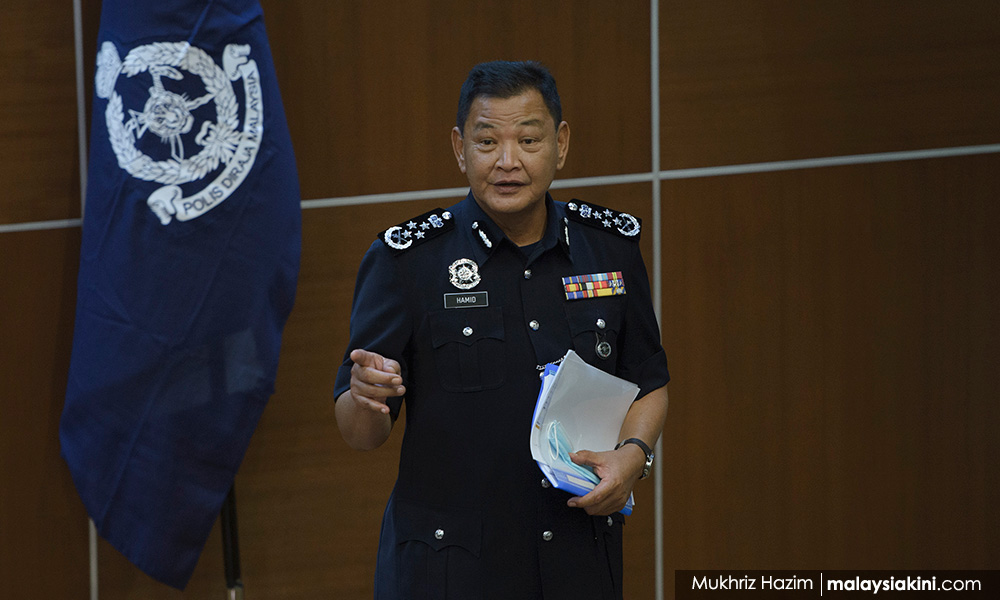The RM10,000 compound which will be imposed on those found violating the movement control order (MCO) and health SOPs can be lessened through an appeal at Health Department district offices, said Inspector-General of Police (IGP) Abdul Hamid Bador.
He said police issuing the compounds do not have the power to reduce the amount of the fine as their only duty is to issue the compound to the offender.
"They (the policemen) will write in the compound that the amount is RM10,000 because, in the Emergency Ordinance, this (the fine) was increased from RM1,000 to RM10,000.
"You have to remember that the police are not given the power to decide whether they want to fine someone RM10,000 or RM5,000 [...] there is no such power given to any police officer.
"So in the notice, they will write RM10,000. But as I've explained before, the target of these expensive compounds are those stubborn repeat offenders," Hamid said during a press conference at Bukit Aman today.
He said repeat offenders will have their names added to the police monitoring system.
Giving an example, he said that if an individual committed a violation such as not wearing a face mask and was issued a RM10,000 fine, consideration might be given based on factors such as that person’s employment background.
If they were labourers or part-time workers, there was a possibility the fine may be lowered to RM50, he said.
Previously, it was reported that individuals who violated MCO rules would face harsher punishments beginning today under the Emergency Ordinance in order to combat the Covid-19 pandemic.
The move sparked a public backlash as many said the fine amount was too high particularly when the people were facing financial difficulties due to the pandemic.
Among others, the compound amount was raised from RM1,000 to RM10,000 for individuals and to RM50,000 for companies. If a case is brought to court, violators can be fined up to RM100,000, jailed up to seven years or both.
Abdul Hamid assured the public that they do not have to fear the law as long as they abide by it.
“It is very easy to comply with. Control our desires, our desire to return to our kampung every weekend or to go back when there is a public holiday.
“We are exposing ourselves to infection in taking our family members from one place to another,” he said.
Sufficient evidence needed
On a separate issue, the IGP said he will leave the decision on the 31 police officers suspected of being involved in a Macau scam to higher authorities, that is the Police Commission.

Explaining the situation, Hamid said the MACC, which took action against the police officers, would have gathered sufficient evidence before they took any serious action against Royal Malaysian Police (PDRM) personnel.
"So I leave it to a higher power than me, the Police Commission, to decide what the punishment should be.
"And the Police Commission has the power if they are dissatisfied with what was reported by my people, to order my people to investigate the matter more thoroughly through the Integrity and Standards Compliance Department (Jips).
"So it takes time. It is not so easy. Give me time," he said.
Hamid was responding to a question on why the 31 police officers were not charged in court like civilians but merely had their duties within the force changed.
On March 9, the NGO Edict questioned why the police did not charge in court its own members who were suspected of being involved in a Macau scam syndicate and online gambling activities.
PDRM's Integrity and Standards Compliance Department (Jips) director Zamri Yahya had reportedly said last week that all 31 policemen had been transferred to other departments while awaiting a decision on their punishments which would be decided by the Police Commission.
Abdul Hamid today said they would have to investigate the matter thoroughly before making any decision on the 31 officers' punishment.
“We have no proof to make criminal charges against them because this (action) was started by the MACC.
“If we make any arrest, we have to make sure that there is proof so that we can take action under the Penal Code or under the relevant acts with the intention to prosecute,” he explained.
He said among the punishments awaiting the policemen were dismissal, demotion or any other appropriate punishment for the wrongdoings.
“Maybe having their increments frozen or having their emolument rights withdrawn or maybe even a warning can be an effective punishment in their career as policemen,” he said. - Mkini




No comments:
Post a Comment
Note: Only a member of this blog may post a comment.